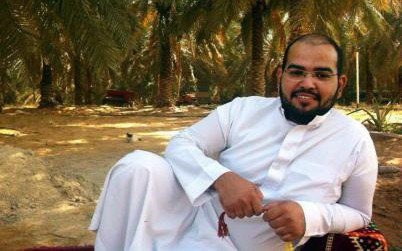On 31 July 2017, the Saudi human rights defender and lawyer Abdulaziz al-Shubaily was informed that the Court of Appeal in Riyadh had upheld his eight-year prison sentence. He is now at risk of being imprisoned at any time for speaking out against injustices and in defense of victims of human rights violations in Saudi Arabia.
Al-Shubaily is a founding member of the Saudi Association for Civil and Political Rights (ACPRA), a human rights organization that documented human rights abuses in the Kingdom of Saudi Arabia while promoting a vision for constitutional reform. As a co-founder of ACPRA, al-Shubaily contributed to the organization’s efforts to promote human rights by providing support and representation to victims of the kingdom’s human rights violations. He also served as the legal representative of nine of the 11 ACPRA members who have been prosecuted since December 2012.
As a result of his human rights work with ACPRA, Saudi authorities summoned him for interrogation in November 2013. They questioned him about statements he had signed defending the right to peaceful protest, and phone conversations in which he discussed demonstrations that took place in the city of Buraydah. After he refused to discontinue his activism, he was formally charged in July 2014 with crimes including, “spreading a statement which calls for continuous demonstrations,” “describing judges as unjust and lacking integrity,” and “accusing security forces and senior officials of suppression, torture, assassination, enforced disappearance and violating human rights.” In May 2016, Saudi Arabia’s Specialized Criminal Court (SCC) sentenced him to eight years in prison followed by an eight-year travel ban. This sentence has now been confirmed by the Court of Appeal and awaits enforcement.
Targeting of ACPRA
Since its formation in 2009 by a group of 15 activists, 11 of whom signed the organization’s founding statement, ACPRA has been committed to the promotion and protection through peaceful means of a distinctly Islamic concept of human rights, based on values such as justice, freedom, and cultural and political diversity. Its political philosophy draws on Shari’a law and Islamic traditions to call for a system of government attuned to the popular will, based on a constitution and the rule of law, and rooted in Saudi ideals. ACPRA also promoted a vibrant civil society with members who are aware of their rights and willing participants in the country’s political decision-making processes.
Though ACPRA is not the only human rights organization to be targeted by the Saudi government, it has faced particularly severe repression. This is because of the high profiles of some of the organization’s founding members. Some are prominent secular activists while others are public figures experienced in Shari’a law and Islamic jurisprudence. The combination of these strains of thought has helped ACPRA bridge the divisions between different ideological groups while also making the organization uniquely qualified to propose changes in the kingdom’s political system. Because of this and their critical stance against Saudi Arabia’s Ministry of Interior (MoI) – denouncing the MoI’s excessive power and its violations of the rights of detainees and prisoners – ACPRA became a prominent target for suppression.
The government’s campaign to dismantle ACPRA began in March 2011 with the arrest of its cofounder, Mohammed al-Bajadi. While al-Bajadi’s trial was underway, authorities began interrogating two of ACPRA’s most well-known founders, Abdullah al-Hamid and Mohammad al-Qahtani. By the time the court ordered the disbanding of ACPRA in early 2013, several other members had either been arrested, sentenced, or were on trial – Saleh al-Ashwan was arrested in July 2012 and Suleiman al-Rashudi was arrested in December 2012. Following the closure of ACPRA, authorities continued prosecuting its remaining free members. During the second half of 2013, the criminal courts convicted Abdulkareem al-Khoder and ACPRA’s youngest member, Omar al Said. In 2014, a court of appeal sentenced Fowzan al-Harbi to 10 years in prison. In 2015, the SCC sentenced al-Bajadi, al-Khoder and Abdulrahman al-Hamid to prison terms ranging from four to 10 years, followed by 10-year travel bans. In 2016, Issa al-Hamid and Saleh al-Ashwan were sentenced to terms of imprisonment ranging from five to nine years, followed by five- to 10-year travel bans.
Saudi authorities used a stock set of charges in prosecuting the ACPRA reformers. These charges were typically vague and frequently equated peaceful political activities with terrorism. The most common accusations included “breaking allegiance to and disobeying the ruler” of Saudi Arabia, “questioning the integrity of officials,” and “seeking to disrupt security and inciting disorder by calling for demonstrations,” as well as “disseminating false information to foreign groups” and “forming or participating in forming an unlicensed organization.”
Out of the 11 founding members of ACPRA that have been sentenced, only two have been released from jail while another two are on bail. The remaining seven activists continue to languish in prison or, like Abdulaziz al-Shubaily, wait to be imprisoned. Saudi Arabia should reverse the latest ruling against Abdulaziz al-Shubaily. It should also release all prisoners of conscience, who continue to be persecuted solely for their work on behalf of victims of human rights violations and government abuses.
Juan Carmelo Rodríguez Melián is an Advocacy Intern at ADHRB.





